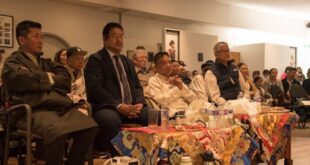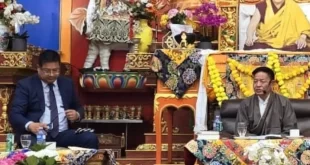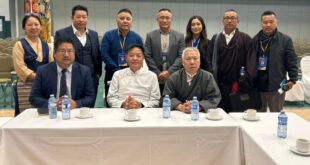Geeta Mohan for India Today| 2 June 2020| Read original news here
Amid escalating border tensions between India and China, the President of Tibetan administration in-exile, Dr Lobsang Sangay, said resolution of the issue of “Tibet” will automatically solve the boundary dispute between India and China since India shares its border with the erstwhile state of Tibet.
Speaking to India Today from Dharamsala where the seat of the government-in-exile is, Dr Sangay said, “The Indo-Tibet border has been in existence for thousands of years of recorded history. Since it has become the India-China border, all these tensions have come up. Hence, the core issue is Tibet. When Tibet was independent, the Indian Army did not require a defence budget of 60 billion dollars, it was not necessary at all. So, once Tibet is demilitarised and declared a zone of peace, two largest populated countries in the world, India and China, will have permanent peace.”
He emphasised that his government was not demanding independence from autonomy, but as has been proposed by the Dalai Lama, they want “genuine autonomy”. “The policy of the Tibetan administration is middle-way approach which is to seek genuine autonomy for all the Tibetan areas so all Tibetan people can have the same cultural, educational, administrative rights and so on and so forth,” Dr Lobsang Sangay said.
The definition of Tibet for them has always been three judicial provinces: Utsang, the central part; Kham and Amdo. These are the three traditional provinces that constitute Tibet.
But, the Chinese government has maintained that Tibet Autonomous Region (TAR) is just the Central part of Tibet. The other two parts have been incorporated into China. Interestingly, Amdo is where the Dalai Lama was born and Kham is where many, including Dr Lobsang Sangay’s parents came from. These are not considered part of TAR. Therefore, the demand to recognise the whole region of Tibet as one rather than just TAR.
As the person representing Tibet, Dr Lobsang Sangay said Lhasa had always maintained that the disputed parts of Ladakh were always part of India as are parts like Tawang in the state of Arunachal Pradesh.
“As far a Macmohan line which mainly concerns Arunachal Pradesh, Tawang is part of India which was signed the Tibetan Prime Minister at that time. So, India says Macmohan line is the preferred border. If it is preferred border to India, then the signatory to that agreement was the government of Tibet and its Prime Minster Longchen Shatra…China didn’t challenge that. From the Chinese side, the objections was, at the time when the Simla convention was signed and letters exchanged, more to do with the border between Tibet and China, not the border between Tibet and India,” he said.
Explaining further, Dr Lobsang Sangay added, “As far as the Ladakh and Sikkim front are concerned, there is the Line of Actual Control (LAC) agreed upon and both countries should abide it and as much as possible demilitarise and make it a zone of peace as proposed by His Holiness the Dalai Lama. That’s the only viable solution proposed on the table.”
Responding to criticism by former diplomat P Stobdan questioning why the Dalai Lama and the Tibetan administration was quiet about the border stand-off during a TV debate, Dr Lobsang Sangay said it was disappointing to see someone speak without facts.
“His Holiness the Dalai Lama has made it very clear. He has always said that Ladakh is a part of India. For Stobdan, who is a resident of Ladakh, to act ignorant is disappointing. I had met him in 2014 when he invited me to speak at his institute, he spoke so highly of Tibetan people and showed so much respect for the Dalai Lama. Suddenly, I see him with utter disrespect. This is not how a diplomat talks. No respect, no civility. I was embarrassed. He got the facts wrong. It was shocking,” said the Tibetan leader.
On the reason behind heightened tensions, Dr Sangay said it was a diversionary tactic by China since there was immense pressure on the Communist Party in the wake of the coronavirus pandemic.
While calling the Chinese administration expansionist, Dr Lobsang Sangay asserted, “The way the Chinese government has handled the coronavirus pandemic which is being perceived wrongly by the world. There is scepticism and definitely trust deficit against China is a reality in the whole world. That is why 130 plus countries have signed and supported a bill saying we must investigate the origin of the current virus which definitely originated in China. So, that is why you have these distractions in the South China Sea and the borders with India. Each time there is internal tension, you want to divert attention of the people and make it external. This is part of the game plan.”
Taking a jibe at Beijing, the leader said China wants to own everything but the one thing that originated from their soil — coronavirus.
“China says Tibet is part of China, Taiwan is part of China, Arunacahal is part of China, Ladakh is part of China, but coronavirus is not part of China. They are staking claim to everything but coronavirus. This is what the Chinese Communist party is capable of,” he said.
When asked if India should internationalise the issue of Tibet and raise it at international fora to counter what China does on Kashmir, he said, “Definitely. China says Tibet is one of their core issues. For all this geopolitical, cultural, historical reasons and the largest number of exiled Tibetans are in India, Indian government could say, for us also Tibet is one of the core issues. Finally, the world is wisening up and India should also say yes Tibet is a core issue and let’s talk about Tibet.”
With the growing clamour about boycotting Chinese goods and products, Dr Sangay pointed that it cannot start with those who buy Chinese goods because they are affordable. He said the boycott should be started by celebrities and influencers who earn by endorsing Chinese products.
“It is for the consumers to decide. Having said that, people will buy if the good is cheap, but when it is your national interest and national security issue, it precedes your individual interest, pleasure or entertainment. If you can do away with software from China for national interest, you should. More than that, people, celebrities who endorse Chinese products, are doing it for money. They needn’t ignore and advertise it and consumers who are their fans will look at the Bollywood stars and follow them. If celebrities stop endorsing for money then it will lead somewhere,” Dr Lobsang Sangay said.



